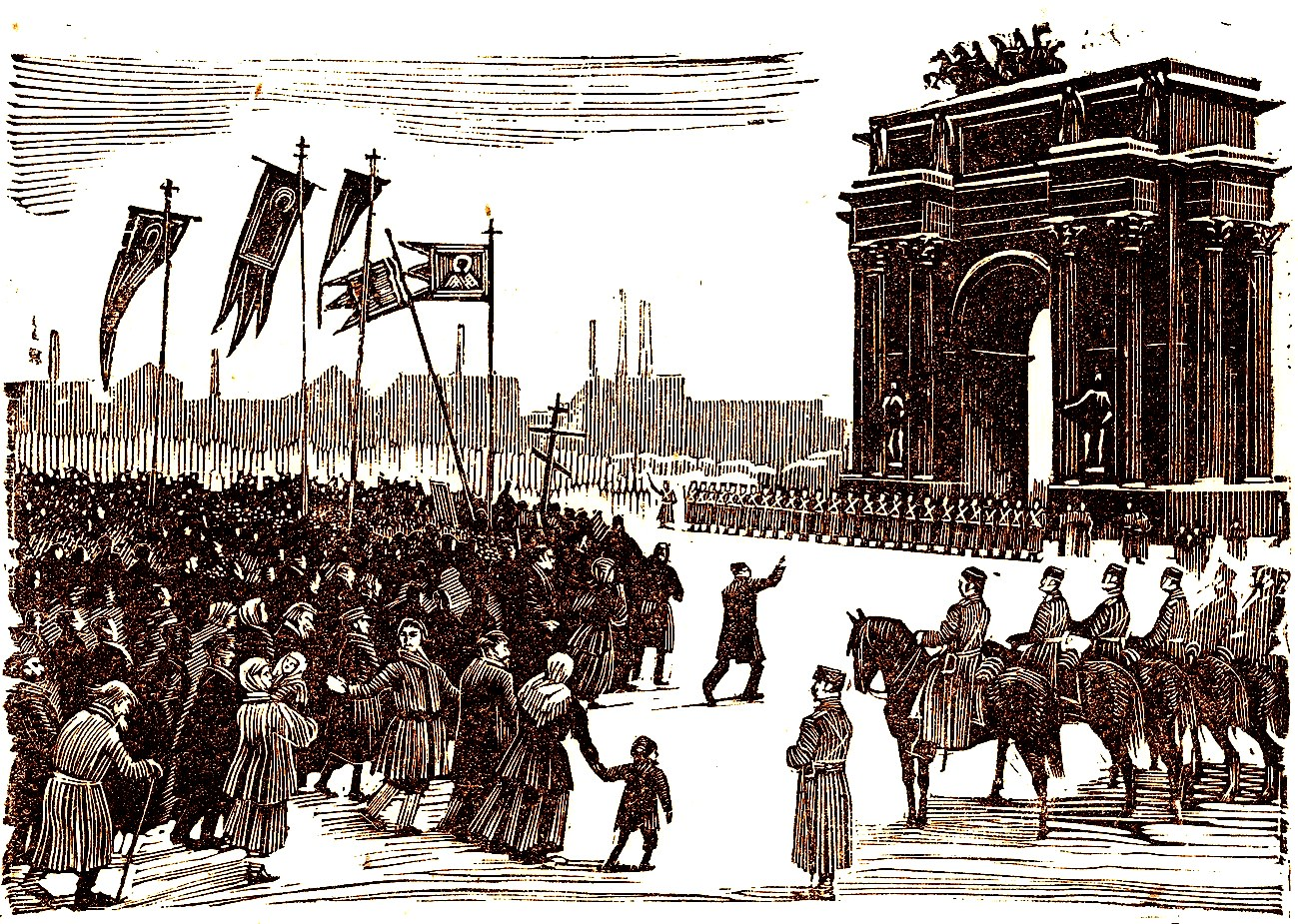The Russian Revolution of 1905, also known as the First Russian Revolution, was a wave of mass political and social unrest that spread through vast areas of the Russian Empire. It included labor strikes, peasant unrest, military mutinies, and the formation of grassroots councils (soviets) of people's power. It is widely felt that the 1905 revolution set the stage for the 1917 Russian Revolutions, and for Bolshevism to emerge as a distinct political movement. Lenin later called it "The Great Dress Rehearsal", without which the "victory of the October Revolution in 1917 would have been impossible".
The 1905 revolution was spurred by the Russian defeat in the Russo-Japanese War, which ended in the same year, but also by the growing realization by a variety of sectors of society of the need for reform in the face of agrarian crisis, economic stagnation, and political repression. However, it is generally felt that the detonator of the insurrection were the events of “Bloody Sunday”, in which a mass demonstration -led by priest and police agent, Georgy Gapon- which had sought to petition the Tsar for relief, was fired upon by the troops, killing hundreds of marchers.
There followed clashes in St. Petersburg, and spreading unrest throughout the rest of the Russian Empire. Strikes spread in three great waves: January, October, and November. In June the crew of the battleship Potemkin famously mutinied against their officers. There were further clashes in St. Petersburg in December.
The rebellion did not overthrow the autocracy, but by late 1905 the Tsar felt obligated by events to agree to constitutional reforms, including the establishment of the State Duma, a multi-party political system, and the Russian Constitution of 1906.
Documents Russian Revolution of 1905
Megathreads and spaces to hang out:
- 📀 Come listen to music and Watch movies with your fellow Hexbears nerd, in Cy.tube
- 💖 Come talk in the New Weekly Queer thread
- 🔥 Read and talk about a current topics in the News Megathread
- 🐱👤 Come talk in the New Weekly PoC thread
reminders:
- 💚 You nerds can join specific comms to see posts about all sorts of topics
- 💙 Hexbear’s algorithm prioritizes comments over upbears
- 💜 Sorting by new you nerd
- 🌈 If you ever want to make your own megathread, you can reserve a spot here nerd
- 🐶 Join the unofficial Hexbear-adjacent Mastodon instance toots.matapacos.dog
Links To Resources (Aid and Theory):
Aid:
Theory:


Btw cross-compiling on Plan 9 is LITERALLY as simple as changing the objtype environment variable to your desired architecture when you want to build something (like putting
objtype=mipsbeforemkon your command line) and binaries for different architectures can coexist on the same machine/filesystem easily. The compilers for every supported architecture are built by default when you build the operating systemSoooo much better than gcc and moderately better than clang with multiple targets
One of the reasons I love Go is because the language's designers took a lot of lessons learned from Plan 9 and even improved on them. For example, that easy cross-compilation is also in Go. As is the lightning-fast compilation.
I should try Go that sounds really cool. {Go/co}routines are also really useful. I know all this but for some reason I've never tried it lol.
It's fun! It's a very practical language. By far my favourite thing about Go is that the standard library is massive. For example, you can write a high-performance HTTP server that can handle a ridiculous number of concurrent requests in only a few dozen lines of code, because all the functions are in the standard library. But despite that huge library, it's really easy to learn because there's a relatively small number of keywords, and all the standard library functions work in a consistent way. If you already have familiarity with C, learning Go is basically a weekend project.
One thing that Go lacks is a mature UI toolkit. It's fantastic for writing memory-safe and fast network services and command line utilities, but I probably wouldn't recommend it quite yet for desktop or mobile apps. The Fyne folks are working on fixing that.